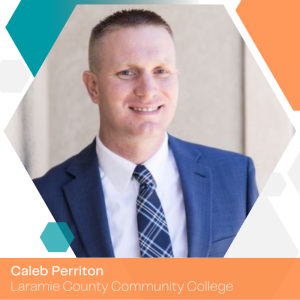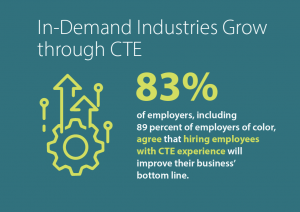Iowa’s College and Career Transition Counselors (CCTCs) are filling a need within school counseling and admission programs for learner-centered, one-on-one support for postsecondary planning and career exploration for Iowa’s learners. Providing learners with the skills to navigate their own career journey helps to ensure that each learner can have success in the career of their choice. The Iowa CCTC program is an example of how local-level innovation can lead to state-wide scale with positive impact on learner outcomes and success. This blog will present an overview of the structure and funding of the CCTC Initiative with considerations and recommendations for state leaders to take first steps towards implementation in their own state.
In 2015, David Ford, Future Ready Coordinator, Mississippi Bend Area Education Agency (MBAEA) and Director of the Area Education Agency Postsecondary Readiness and Equity Partnership (AEA PREP), was recruited to the Eastern Region of Iowa because of his research on secondary to postsecondary transitions. At the time, the region had the lowest postsecondary enrollments in the state and historically poor postsecondary outcomes. In partnership with Eastern Iowa Community College, Louisa-Muscatine and Columbus Community Schools and with support from the Future Ready division of MBAEA, the College and Career Transition Counselor (CCTC) position was created in 2017. Over the course of a few years, significant improvements were shown in Free Application for Federal Student Aid (FAFSA) completion rates and college intention as well as overall positive postsecondary outcomes for the learners who were part of a CCTC’s roster.

 Source: Partnerships that Work: College and Career Transition Counselors a Case Study from Eastern Iowa
Source: Partnerships that Work: College and Career Transition Counselors a Case Study from Eastern Iowa
Thanks to the success of the Eastern Iowa program, David was asked to present to college presidents statewide and when the demand for CCTCs across additional community colleges and high schools grew, David partnered with the Iowa Department of Education, Bureau of Career Technical Education to scale the CCTC program. Using the Eastern Iowa program as a model, the Department of Education launched its statewide CCTC Initiative in the 2021-2022 school year.
The time and effort required to establish a CCTC program is well worth it; Iowa has seen continued improvement in FAFSA completion rates and postsecondary intention. For the class of 2022, the overall FAFSA completion rate for the high schools served by a CCTC was 59.3%, up from 41.5% for the class of 2021. David Ford states that the CCTC Initiative is “one of the few strategies that I’ve come across that is directly improving outcomes for first-generation students.”
Read on to learn more about how the Iowa CCTC Initiative is structured and funded as well as for considerations and recommendations for implementing a similar program.
The Eastern Iowa Model
While districts and community colleges have flexibility in how they structure their CCTC position(s), the majority of the current programs in Iowa follow the Eastern Iowa Model. Within this model, a community college forms a partnership with two high schools within their local area to share a CCTC. The CCTC is an employee of the community college, however, they work within the high schools as well as on the community college campus. It is important to note that the number of schools sharing a CCTC can vary based on the needs of each specific partnership. A community college may form multiple partnerships with local area high schools, employing multiple CCTCs, to best meet learner needs. For the 2023-2024 school year over 50 CCTCs will serve learners in over 100 high schools employed across all 15 community college regions in Iowa.
The Role of the CCTC
The CCTCs serve as a liaison between the secondary and postsecondary partners while providing direct support to the learners on their roster; they complement the school counseling department and can go deeper into postsecondary options and opportunities than school counselors are able to. Danielle Sampson, a former school counselor and CCTC, now Community Engagement Specialist with Iowa College Aid, part of the Iowa Department of Education and a CCTC initiative partner, explains that “the CCTC does things that school counselors don’t have the time to do.” Additionally, while school counselors are tasked with serving the entire student body, the CCTC can target learners who need more support in developing and pursuing a postsecondary plan.
The CCTC’s roster (caseload) is capped at 300 learners and is often generated by targeting first-generation college students, learners who are economically challenged and English learners (ELs). Danielle believes that most families have a need for additional support, however, as admission processes and post-secondary options have changed drastically in the last 20 years. Learners generally begin working with a CCTC in their junior year (11th grade) and continue working with the CCTC through their first postsecondary year.
A typical week for a CCTC could involve a wide variety of activities including career exploration field trips, coordinating career expo events, college campus visits, apprenticeship tours, working with military recruiters, a parent FAFSA night, individual student meetings, teaching a “How College Works” class, paperwork for concurrent enrollment, connecting with Iowa Intermediary Network or work-based learning coordinators, helping learners with test preparation, small group meetings, and meetings with families which could include helping them to complete FAFSA or other paperwork.
State Role in Striving for Consistency in Scale
In order to create consistency and alignment with the general role and responsibilities of CCTCs across the state, the Iowa Department of Education brought on Erica Wood-Schmitz, a former school counselor who has first-hand experience working alongside a CCTC, to oversee the CCTC program as Education Program Consultant: Academic and Career Planning.
To further increase consistency and alignment across the state, the CCTC Steering Committee, which Erica oversees, was formed and is comprised of community college supervisors, representatives from the Iowa Department of Education, school counselors, representatives from local districts, Iowa College Aid and AEA PREP.
The CCTC Steering Committee created a standard job description of the CCTC including clearly defined roles and responsibilities. Additionally, the CCTC Steering Committee created competency statements that would guide the training of the CCTCs. Realizing the need for a greater voice from the CCTCs themselves, a CCTC Leadership Team, comprised of CCTCs from the field, was formed to help create the training plan and to inform the competencies, roles and responsibilities.
Qualifications and Training
At the inception of the state-level CCTC Initiative, a CCTC was required to have a master’s degree with a license or endorsement in school counseling. This is still the preferred education requirement, however, in order to better meet demand, those with a related master’s or a bachelor’s degree are now eligible. If a partnership will require the CCTC to teach a college success course, they must have a master’s degree.
To best train and meet the individual learning needs of the CCTCs, the CCTC Initiative uses a cohort model. Currently, there are three cohorts:
- Cohort 1 – CCTCs that were part of the original Eastern Iowa program and new CCTCs for the 2021-2022 school year
- Cohort 2 – new CCTCs for the 2022-2023 school year
- Cohort 3 – new CCTCs for the 2023-2024 school year
CCTCs create their own Individual Learning Plan (ILP) relative to their districts’ needs and receive support from the CCTC Leadership Team and Erica. They attend a two-day training held in August for cultural competency development, data and goal setting. Iowa College Aid plays a large role in providing training and resources for the CCTCs.
Funding
To incentivize and help districts and community colleges create a CCTC program, the Iowa Department of Education has used its Carl D. Perkins Career and Technical Education Act Reserve Funds (Perkins Reserve Funds) to create a three-year tiered grant for which CCTC partnership schools can apply. The districts split the cost of the shared CCTC with the community college, estimated to be $65,000-75,000 annually with benefits. The tiered grant is structured as follows:
- Year 1 initial Iowa Department of Education grant funding: Perkins incentive support (up to $40,000 per position*). *Funding amounts are subject to change.
- Year 2 Iowa Department of Education grant funding: Perkins support ($7,500).
- Year 3 Iowa Department of Education grant funding: Perkins support ($2,500).
School districts may also be able to access operational sharing dollars and federal grants to help fund the CCTC program. To continue to scale the initiative the 15 community colleges across Iowa received federal grant funding to add 15 new CCTCs for the 2023-2024 school year bringing the state total over 50.
Challenges
There are some challenges that the CCTCs have faced that create additional barriers to serving the learners on their roster.
- Clear communication among faculty and between the institutions sharing a CCTC. Within the districts, CCTCs can receive push-back from school counselors who do not understand the CCTC’s role. In order to overcome this hurdle, clear information on the role of the CCTC and how they complement, and not compete, with the counseling department is needed.
- Different interpretations of the role of the CCTC between institutions. Districts may see the CCTC as another school counselor while community colleges may see them as an addition to their admissions team. The CCTC is not intended to be a recruiter for the community college and while enrollment may increase as a result of their work with learners, college is not the only path after high school graduation. To this end, it is important for CCTCs to broaden their understanding of what college is. Danielle Sampson explained it well, “college is anything a student does to build a skill set after high school – apprenticeship, military, trade school or a two or four-year college.”
- Difficulty navigating the competing schedules between buildings and this is where communication between the partnering institutions is key. The CCTC is truly a shared position and the administration across institutions must be willing to work together to help set the CCTC up for success. “The partnership and the relationship between the community college and high schools that share the counselor are paramount to the success of the program,” shared David Ford. “If the relationship isn’t there, it will really hinder if not destroy the program.”
Considerations and Recommendations
For states that may be interested in trying to create their own CCTC initiative, Iowa State CTE Director Dennis Harden emphasized the importance of building relationships between local districts and community colleges. Dennis shared that it is Iowa’s strong dual and concurrent enrollment programs that laid the foundation for these relationships and the early success of the CCTC Initiative.
Dennis along with Erica Woods-Schmitz, David Ford and Danielle Sampson have the following recommendations for those considering starting a CCTC program:
- Intentionally create opportunities and incentives for relationship building between districts and colleges.
- Target districts driven by data to serve as pilot programs. The districts must understand their data and using additional data beyond FAFSA completion will allow for better overall tracking of program results.
- Create an oversight or governing body to ensure consistency in training, roles and responsibilities (i.e. steering committee, leadership team).
- Have a clear understanding of how districts and colleges can braid funding, including Perkins Reserve Funds to fund the program long term.
- Partner with intermediaries (like Iowa College Aid and AEA PREP); these partnerships are integral to success as they can help facilitate the program and train CCTCs.
- Encourage colleges to find the right match between the CCTC and the high school(s) they will be serving.
- Encourage CCTC programs to evaluate the highest times of need for a CCTC and consider a 10-month period that may not fit exactly within the standard school year. This may allow the CCTC to be available over the summer when learners transitioning out of high school and into their postsecondary path have a need for guidance.
For more information on Iowa’s College and Career Transition Counselor Initiative, please visit the following resources:
Jodi Langelotti, Communications Associate
 I could not be more delighted to join the team here at Advance CTE! A self-proclaimed “Career Technical Education (CTE) evangelist,” I’ve spent much of my career designing, implementing and supporting policies and practices that create the conditions for high-quality CTE to flourish, and have had the pleasure to learn from and work alongside the Advance CTE team and members over those years. As a former State CTE Director and Advance CTE member, it is an honor to be able to give back to an organization that has given so much to me and to the field at large.
I could not be more delighted to join the team here at Advance CTE! A self-proclaimed “Career Technical Education (CTE) evangelist,” I’ve spent much of my career designing, implementing and supporting policies and practices that create the conditions for high-quality CTE to flourish, and have had the pleasure to learn from and work alongside the Advance CTE team and members over those years. As a former State CTE Director and Advance CTE member, it is an honor to be able to give back to an organization that has given so much to me and to the field at large.

 On Tuesday, the House formally reconvened after Congress’ annual August recess. The Senate has been in session since last week and is working to advance a “minibus” funding legislation– a measure containing three of the 12 individual spending bills that compose the federal budget. As a reminder, the Senate Appropriations Committee has
On Tuesday, the House formally reconvened after Congress’ annual August recess. The Senate has been in session since last week and is working to advance a “minibus” funding legislation– a measure containing three of the 12 individual spending bills that compose the federal budget. As a reminder, the Senate Appropriations Committee has  Tell me more about your journey to the Fellowship.
Tell me more about your journey to the Fellowship. I was made aware of the Fellowship through the Wyoming State CTE Director Michelle
I was made aware of the Fellowship through the Wyoming State CTE Director Michelle  Distance learning breaks down geographical barriers, enabling students from remote or underserved areas to access high-quality CTE programs. By offering online courses, CTE programs can reach a broader audience of learners, including those who may face obstacles in attending traditional in-person classes. This increased accessibility can result in a more diverse and inclusive CTE learner population. The fifth principle of
Distance learning breaks down geographical barriers, enabling students from remote or underserved areas to access high-quality CTE programs. By offering online courses, CTE programs can reach a broader audience of learners, including those who may face obstacles in attending traditional in-person classes. This increased accessibility can result in a more diverse and inclusive CTE learner population. The fifth principle of 
 Overall, micro-credential earners interviewed for this study perceived their experiences favorably and believed that efforts to earn such credentials would result in economic mobility through higher education and income levels. Earners indicated that micro-credentials allowed for more timely feedback and that each credential motivated earners to continue their progression. While stakeholders remain optimistic about the value of micro-credentials, many earners are still unsure of how earning micro-credentials may or may not impact their long-term employment trajectories.
Overall, micro-credential earners interviewed for this study perceived their experiences favorably and believed that efforts to earn such credentials would result in economic mobility through higher education and income levels. Earners indicated that micro-credentials allowed for more timely feedback and that each credential motivated earners to continue their progression. While stakeholders remain optimistic about the value of micro-credentials, many earners are still unsure of how earning micro-credentials may or may not impact their long-term employment trajectories.


 There has been an increasing push within the manufacturing industry to reshore more production back to the U.S. due to recent legislation at the federal and state levels. While there have been policies regarding federal purchasing that require domestic production, such as the Defense Federal Acquisition Regulation Supplement (DFARS), the Buy American Act and recently the Build America Buy America Act, there are now new policies being enacted focused on supporting private sector domestic sourcing. The Creating Helpful Incentives to Produce Semiconductors and Science Act of 2022 (CHIPS and Science ACT) is intended to increase more domestic production of semiconductors, but also to support the growth of new and emerging technologies such as quantum computing, AI, clean energy and nanotechnology. To facilitate this growth, the CHIPS Act authorizes $174 billion over the next five years for STEM programs, workforce development and research and development (R&D).
There has been an increasing push within the manufacturing industry to reshore more production back to the U.S. due to recent legislation at the federal and state levels. While there have been policies regarding federal purchasing that require domestic production, such as the Defense Federal Acquisition Regulation Supplement (DFARS), the Buy American Act and recently the Build America Buy America Act, there are now new policies being enacted focused on supporting private sector domestic sourcing. The Creating Helpful Incentives to Produce Semiconductors and Science Act of 2022 (CHIPS and Science ACT) is intended to increase more domestic production of semiconductors, but also to support the growth of new and emerging technologies such as quantum computing, AI, clean energy and nanotechnology. To facilitate this growth, the CHIPS Act authorizes $174 billion over the next five years for STEM programs, workforce development and research and development (R&D). To maximize’s CTE’s value in reshoring, employers must be informed on its alignment with reshoring-connected careers and be partners in designing CTE programs to meet skills needs. Advance CTE’s employer engagement
To maximize’s CTE’s value in reshoring, employers must be informed on its alignment with reshoring-connected careers and be partners in designing CTE programs to meet skills needs. Advance CTE’s employer engagement 